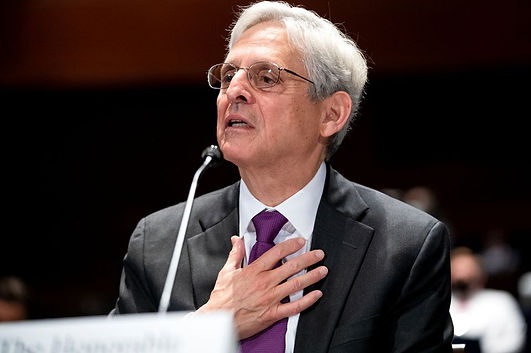
My Reporting
My Reporting
My Reporting
Do not use if
a person of color
alone in public
disabled
mislabeled
in parking garage / other dark space
of low income
plus size
queer
near beer
trans &/or other gender expression
suffer from mental illness - ie depression
showing skin
Using under above conditions could result in
serious sometimes fatal conditions such as
derogatory descriptions
heightened lack of legitimacy
heightened lack of representation
heightened lack of opportunity
generalized harassment
irregular levels of oppression
increased risk of abuse
persecution - may result in execution
use - as object, as story, as statistic > its sadistic
Usage instructions
take twice daily
or as needed - If you pleaded
with supervision
choking hazard
Garland Responds to GOP Questions on the Constitutionality of School Board Memo
U.S. Attorney General Merrick Garland testifies before the House Judiciary Committee oversight hearing of the Department of Justice, October 21, 2021. (Greg Nash/REUTERS)
By August Barham
Nov. 11, 2021
WASHINGTON—GOP House Judiciary Committee members grilled Attorney General Merrick Garland on his Oct. 4 memo addressing a nationwide increase in violence and threats of violence made against school boards during a Justice Department Oversight Hearing on Oct. 21— saying the memo treated involved parents as domestic terrorists.
Garland’s memorandum to the FBI came shortly after The National School Boards Association (NSBA) detailed the spike in violence in a Sept. 29 letter to President Biden. In the letter, the NSBA listed instances of violence from parents during school board meetings over mask requirements and teaching critical race theory in schools and asked for assistance from federal law enforcement.
“As these acts of malice, violence and threats against public school officials have increased, the classification of these heinous actions could be the equivalent to a form of domestic terrorism and hate crimes,” wrote President Viola M. Garcia and CEO Chip Slaven, in the NSBA letter.
In his memo, Garland wrote that the Department of Justice (DOJ) would be announcing measures to discourage, address and prosecute criminal conduct aimed at school staff. The memo did not use the terms “domestic terrorists” or “domestic terrorism.”
During the Oct. 21 Oversight Hearing, GOP House Judiciary Committee members cited the NSBA letter and DOJ memo to ask Garland why he was classifying involved parents as domestic terrorists and violating their First Amendment rights.
“I have found it deeply disturbing that the National School Board Association convinced the Biden Administration to sic you and your Justice Department, the FBI, the full power of the federal law enforcement in this country on involved parents as if they were domestic terrorists,” said Representative Steve Chabot (R-OH).
Garland said that DOJ did not classify parents expressing their opinions as domestic terrorists and that the memo only applied to acts of violence.
“I do not believe that parents who testify, speak, argue with complain about school boards and schools should be classified as domestic terrorists or any type of criminals,” Garland said. “Parents have been complaining about the education of their children and about school boards since there was such a thing as school boards and public education.”
Democratic committee members echoed Garland’s claim that the memo did not target parents exercising their right to free speech but addressed a rise in criminal conduct.
“The personal and physical attacks that have been directed against school leaders in recent months have crossed well over the line of protected free speech or parental involvement and have become criminal conduct,” said Representative Mary Scanlon (D-PA). “That is what we are talking about here.”
Chabot also argued that Garland’s memo violated the FBI’s domestic terrorism policy which says that no federal investigative activity should be based on First Amendment activity alone— laid out in the FBI’s primer on domestic terrorism.
“We don’t need the vast power of the federal government throwing its weight around,” Chabot said. “We don’t need you, your Justice Department or the FBI trampling on the rights of American parents who just want the best possible education for their children.”
Garland clarified that the memo did not target parents’ free speech but addressed the spike in physical violence and threats occurring in school board meetings across the country.
“We (the DOJ) greatly respect the First Amendment right of parents to appear before school boards and challenge and argue against provisions that the school boards are doing,” Garland said. “This memorandum has nothing to do with that.”
Garland said that the memo only responded to an unproduced form of speech— true threats.
“The Supreme Court is quite clear that the First Amendment protects spirited, vigorous argumentative even vituperative speech,” Garland said. “It is perfectly acceptable for people to complain about what their school boards are doing or what their teachers are doing in the most aggressive terms. What they are not allowed to do is threaten people with death or a serious bodily injury— the so-called ‘true threats’ line of cases.”
Democratic committee members also responded to GOP concerns, saying that Garland’s memo was carefully worded as not to infringe upon parents’ free speech.
“I notice that not a single member of this committee has cited a single sentence in your memo as violating anyone’s rights, not one,” said Representative Jamie Raskin (D-MD). “They have not cited a single sentence from your memo because your memo scrupulously follows the difference between conduct and speech.”
Following clarification from Garland and Democratic committee members that the memo only referred to unprotected speech, GOP lawmakers said the memo did not sufficiently address a possible chilling effect. Such an effect would mean parents restricted their own protected speech out of fear that the memo applied to them. A chilling effect usually occurs when a federal action is too broad or vague and renders that action unconstitutional.
“Other than a brief nod to the concept of First Amendment rights, you include no guidance in your memo on how the FBI should go about avoiding chilling, intimidating legitimate First Amendment activity,” said Representative James Daniel Bishop (R-NC).
